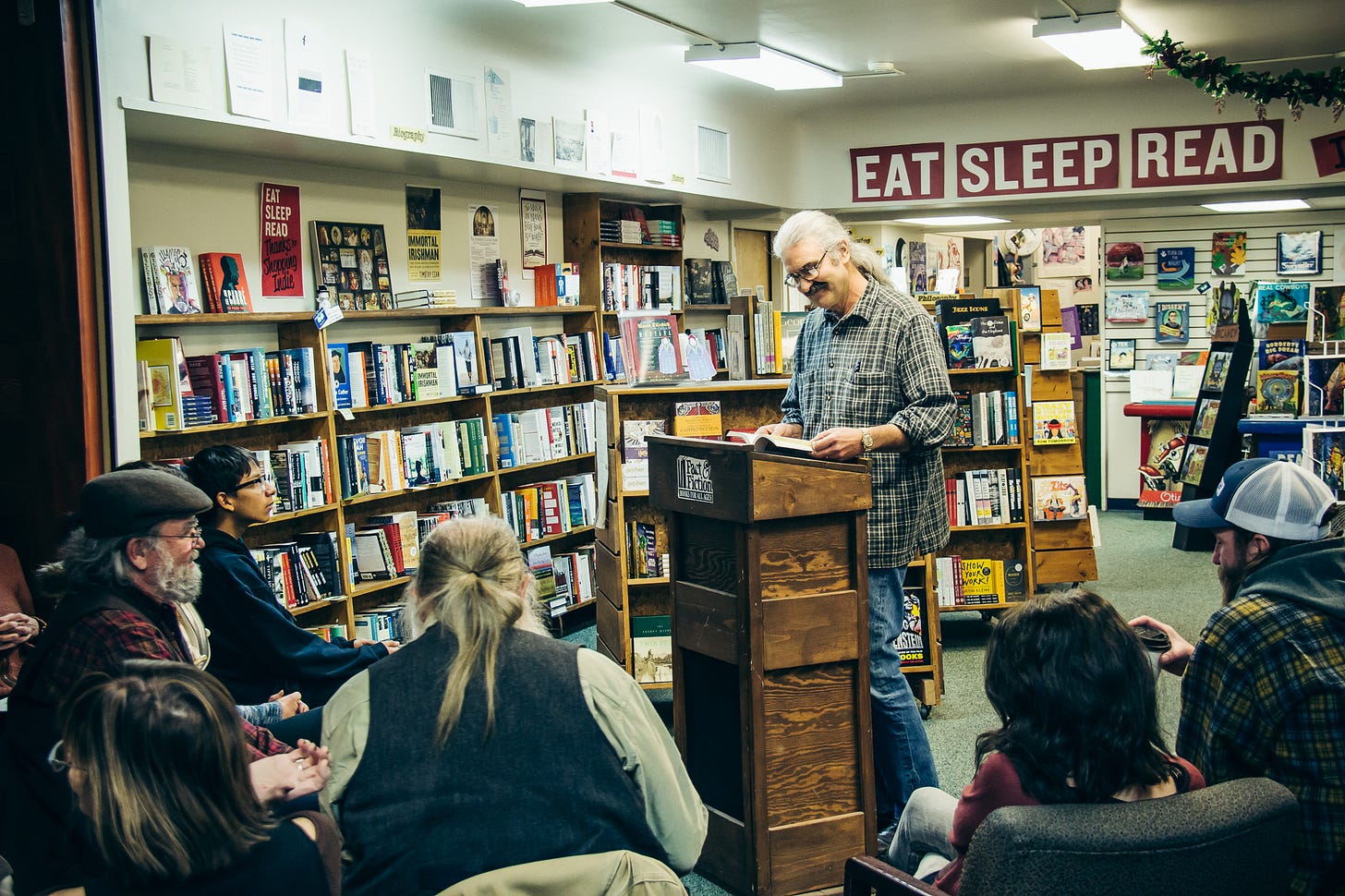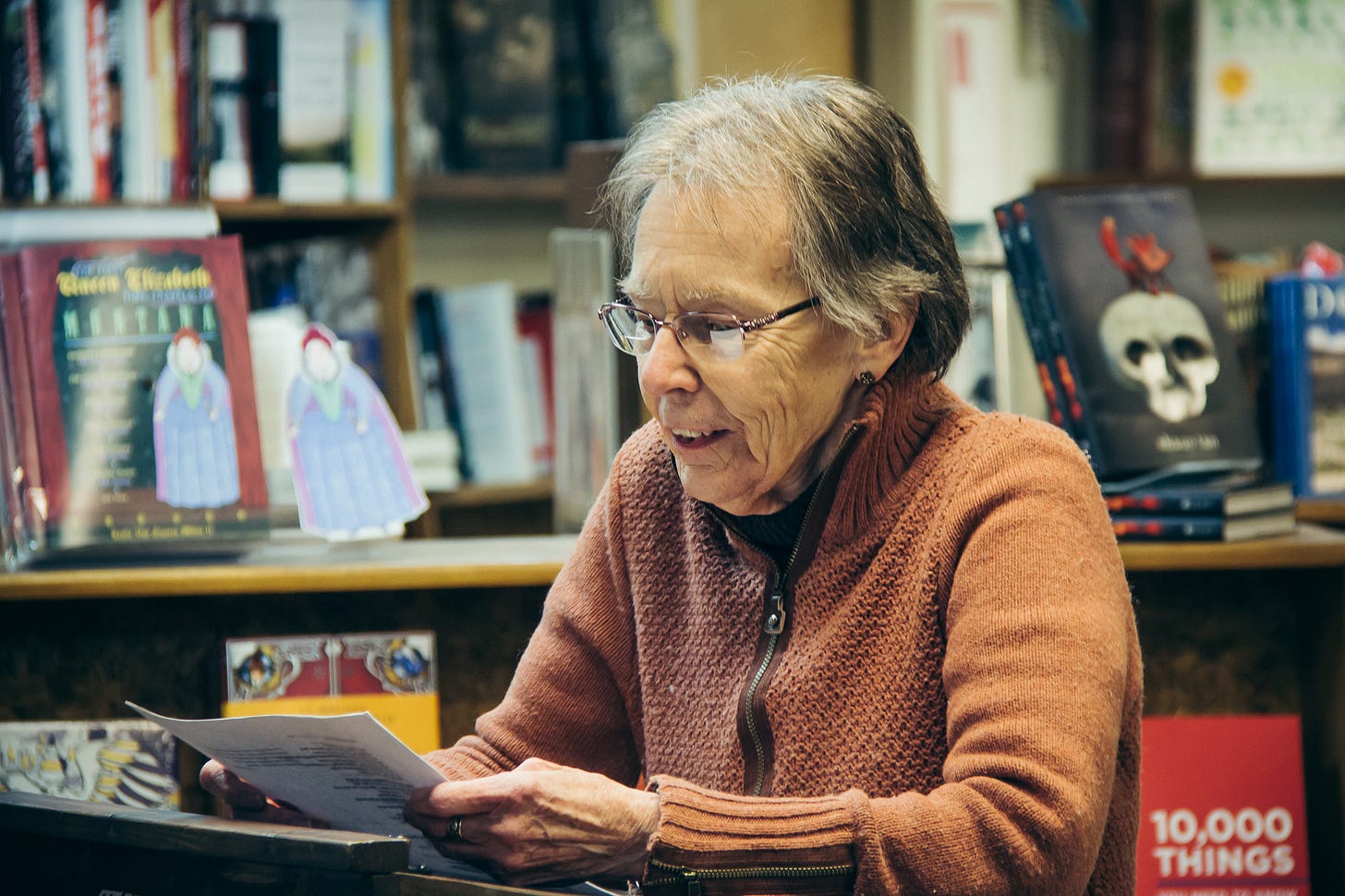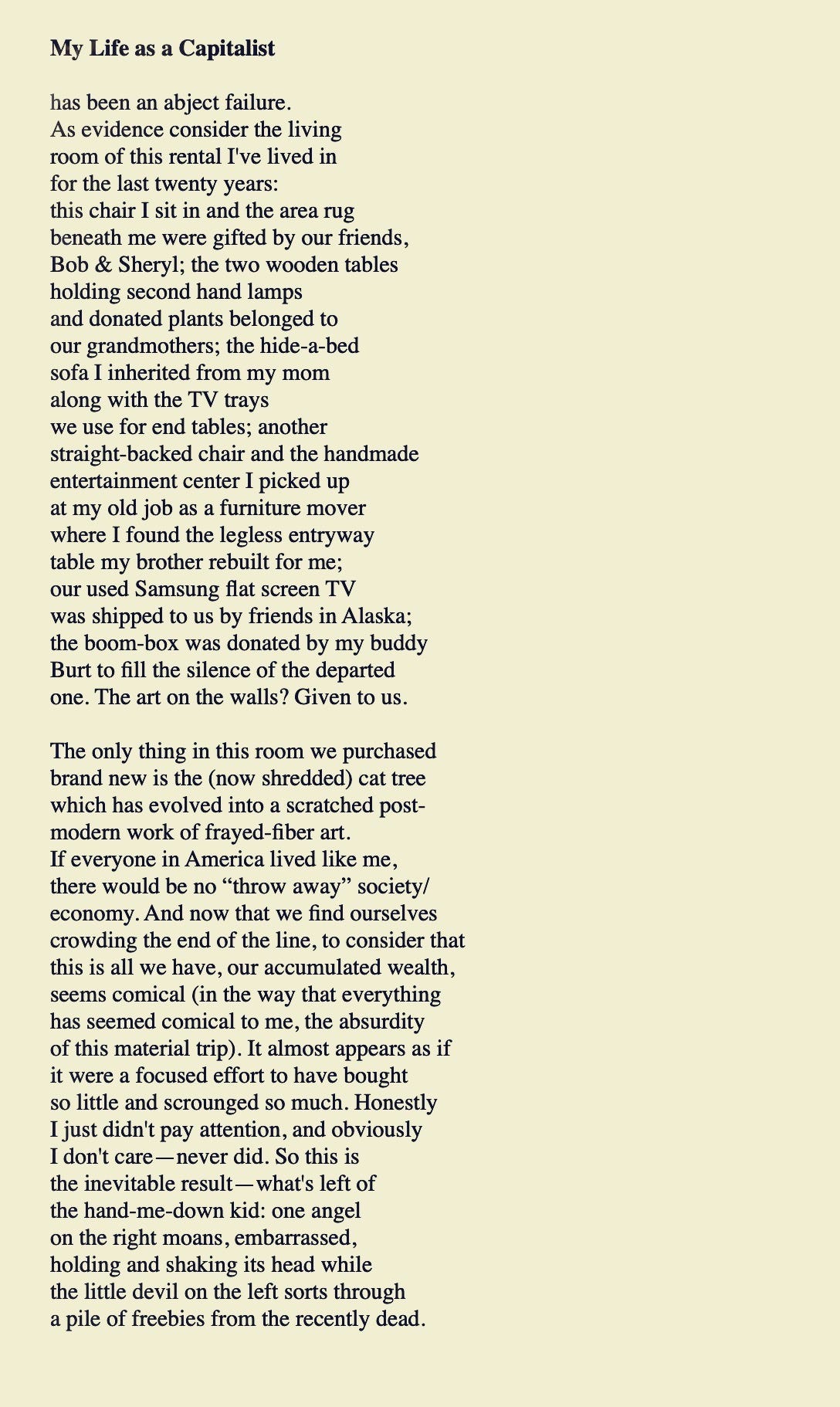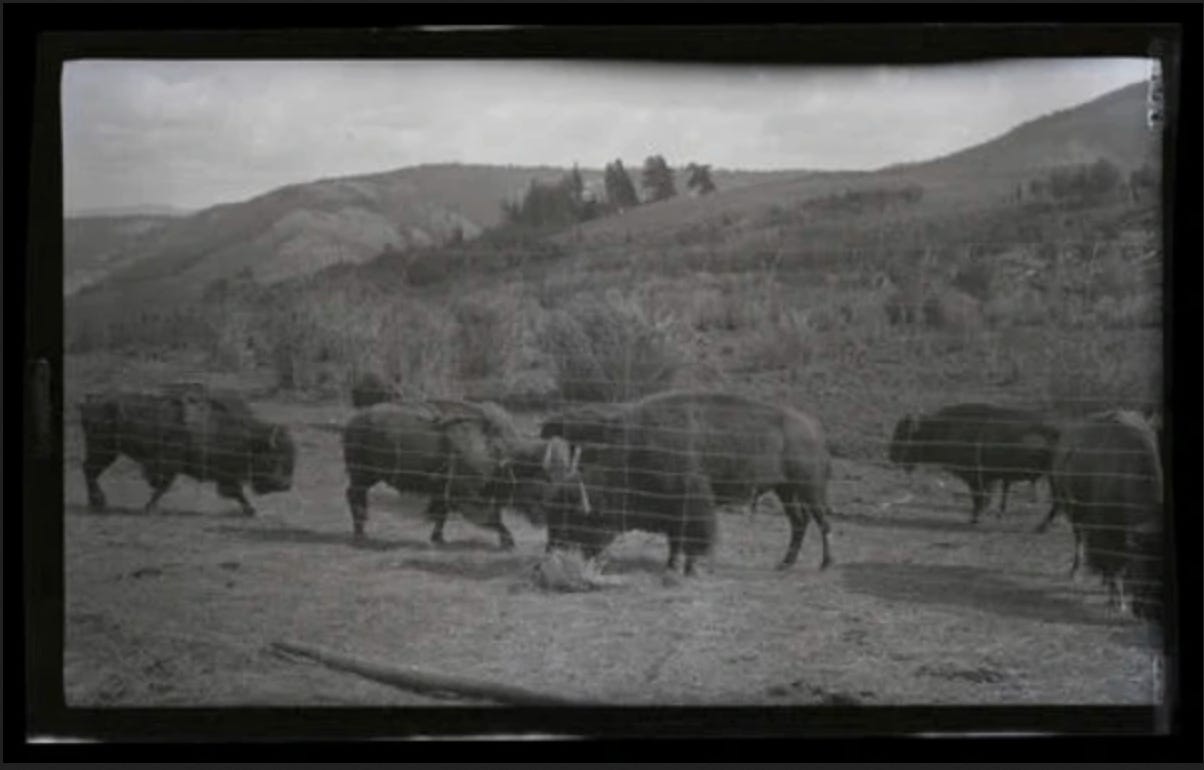Boozhoo! Aaniin! Welcome to the midweek(ish) version of An Irritable Métis. This is where things are usually a little more random, a little less … irritable. If you forgot what all this is even about, you may remind yourself here. If you want to help keep a writer out of hard labor, well….
National Poetry Month

During the pre-Covid autumn of 2019 it was the Montana Book Festival and I was still working part-time at Fact & Fiction. In the shared conference room that separates the bookstore from the architects next door a poetry reading and panel discussion was going on. There were four or five poets participating, including former Montana Poet Laureate Earl Craig. The place was packed and spilled out into the store; I’m guessing there were 30 – 50 people there, I don’t know. Things seemed to be going well too. Voices were muffled but there were loud bursts of laughter several times. As things wrapped up I was behind the counter at the register, and I’m pretty sure The Mara was there too.
The wall-sized sliding door opened a little wider and people came happily tumbling out. Mara and I were poised behind a display of books written by these poets and not a single person stopped. Not one book was sold in the aftermath of the event. It’s possible people purchased them later, maybe, but not then. I was stunned. And it bummed me out.
At risk of sounding cynical (*cough*), this is why I have a bit of a humbug attitude anymore about things like National Poetry Month, which we are about a week into. In case you don’t know what it is, here’s the lowdown:
Launched by the Academy of American Poets in April 1996, National Poetry Month reminds the public that poets have an integral role to play in our culture and that poetry matters. Over the years, it has become the largest literary celebration in the world, with tens of millions of readers, students, K–12 teachers, librarians, booksellers, literary events curators, publishers, families, and—of course—poets, marking poetry's important place in our lives.
This might be the wrong place to ask this question since you glorious subscribers are obviously anything but ignorant philistines in such matters1, but is poetry really an “important place” in the lives of many people? The running joke when it comes to poets is they are the purist practitioners of literature because they obviously aren’t in it for the money. Which sucks when you think about it. So I have to wonder: how many people really engage with poetry on a regular basis? How many people actually buy it?
The stuff that goes on around National Poetry Month is worthwhile, I just wish it wasn’t relegated to one month. April rolls around and people get all performative with their love of poetry, share links to poems published online or whatever, but where does it go from there? I encounter many people who tell me, “I don’t get poetry.” That’s fair. I didn’t “get” it for a long time either. When poetry had a bag dropped over its head and was rolled in a carpet and hauled off to the ivory towers to be enjoyed by only a stuffy few the connection to its roots was severed. I contend, though, that there is poetry for everyone. Everyone. Folks who don’t get it just haven’t read the right poems. The stuff we are educated in poetry with during our school days doesn’t help. Too often, “classic” is just a euphemism for worn out. What do I have in common with some crusty old English aristocrat who died 100 years ago? Give me an ill-tempered, one-eyed old birdwatcher who swigs red wine and eats fried chicken from Albertson’s instead.
But I was one of those people, for years and years, who didn’t get it. Then I read a particular poem that knocked my lights out. Words and lines formed together that felt like they were pulled from my own brain. I never looked back. I never had any idea — or intention — that anyone would ever call me a poet until it started happening. It felt pretty good. It felt a little subversive. I love that about it.
Now poetry is part of my every day. I read some every morning. I don’t so much as write poetry as live it. “The purpose of poetry is not to learn more about poetry, but more about life,” Robert Bly said, and I believe him. I tell my poetry kids that poetry is life, how they live their lives, how they share their lives. The study of it is the study of what it means to be alive. What ends up on the page is the least important part of the process.
So I will grudgingly admit that I am in favor of National Poetry Month. I just wish more people would extend it beyond April and into the next month, and the next, and the next….

Poetry as Spiritual Practice
Is it? Can it be? Yes! I did a version of this as an online thing last fall and it went very well so I’m doing it again. Twice, in fact. With some tweaks and rethinkings here and there, of course. I’ve got one planned for the fall, which will also be virtual, but also this one, in person, in the Lamar Valley of Yellowstone National Park, under the auspices of Yellowstone Forever. You can dig the registration HERE. Here’s the lowdown:
The practice of quiet attentiveness and observation is critical to the writing and enjoyment of poetry, and a key element of what makes life living in many, many ways. It is a refuge for me. Perhaps it can be for you too. The course will include reading and discussing and writing poems from three (or more) points of reflection. In particular, impermanence, mindfulness, and joy, and how these ideas relate to a spiritual practice, regardless (or lack) of religion. The instructor's approach is deeply connected to the natural world, and there will be particular emphasis there.
I hope some of you can make it happen. I did one for these folks in February and loved it. Summer will be spectacular. And warmer, which means more time outside. I can hardly wait.
Besieged
The good people at Journal of the Plague Years (via my longtime friend Susan Zakin) asked me if they could republish one of my recent pieces. I was happy to oblige. It has a new life with some few tweaks here and there under the title “Besieged,” which I love. Check it out HERE and while you’re there, poke around a bit. There is some great writing to be uncovered. Who knows, you might be compelled to subscribe.
Mutual Aid
Buying poetry is a kind of mutual aid, in my opinion, not only for poets but for bookstores and publishers. It’s important. It shows the world there is value in what everyone involved is doing, which is also important. As I’ve said before, this Substack model that allows writers like me to get paid for our work is also a kind of mutual aid. Which is why I love it when folks subscribe.
Besides allowing me to do more actual writing, it allows other things. My friends with bigger platforms than mine, like Anne Helen Petersen and Lyz Lenz, talk about how it allows them to have guest writers on occasion who they are able to pay for their work, and to pay well. That’s fantastic. Now I get a chance to do a little bit of the same thing myself.
In June I am leading another Blackfoot River Workshop for the Freeflow Institute. These trips aren’t cheap and I assure you it’s not because any of us involved are rolling around in piles of cash. There are fees, insurance, gear requirements, etc. It adds up. But because my supporters here are propping me up, I’m able to participate in providing this scholarship that anyone may apply for that will enable one person to take the trip, and the workshop, for free. If this is the kind of thing you’ve always wanted to do, I urge you to apply. My goal is to get someone’s butt on a raft and hope they fall as deeply in love with the world the way as I have. So CLICK HERE. Besides that one for my trip, there are several others too, for use on any Freeflow trips. CHECK THEM OUT as well.

And Finally….
Just some wonderful poems.


Read some poems, friends. Buy a few books of poetry. Try your hand at writing a few. The world will be better for it.
Except for when it comes to how most of you eat your cake and ice cream, apparently.





"Give me an ill-tempered, one-eyed old birdwatcher who swigs red wine and eats fried chicken from Albertson’s instead." Amen.
The poems you shared here are superb. I’m also a fan of Buddy Wakefield and Scott Wannberg and Kate Baer and Ellen Bass. Sun Magazine was where I learned poetry can be good. Seems like we are bored to death by poetry we are taught in school and that puts us off it like Brussels sprouts. But then you hopefully grow up and learn boiled Brussels aren’t actually a good representation of the vegetable and throwing them on the grill makes all the difference. Anyway, fellow poetry lover here!